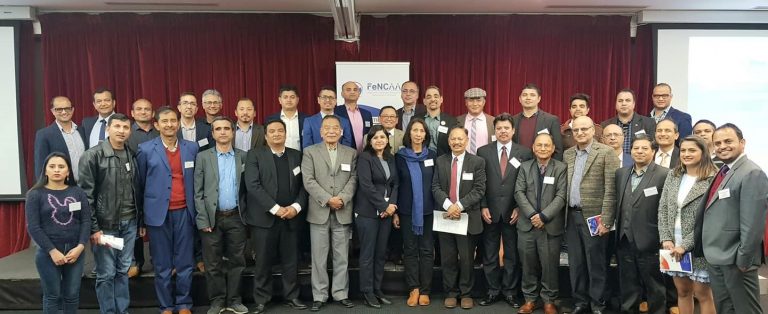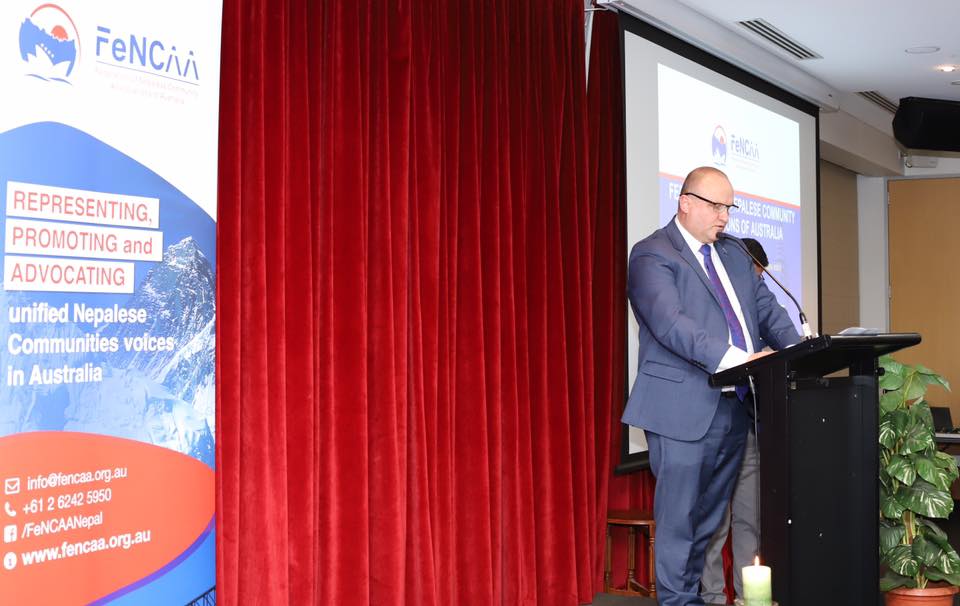
Federation of Nepalese Community Associations of Australia (FeNCAA) has been formally established amidst a formal program in Canberra, Australia. Registered under the Associations Incorporation Act 1991, FeNCAA was formally incorporated in 2017.
Said to be an umbrella association – FeNCAA aims to unify all associations relating to the Nepali diaspora in Australia – and in the process aims to become a unified voice for thousands of Nepalese in Australia across all tiers.
The formal inauguration of FeNCAA establishment was held on 10th September, 2019 in the Australia’s national capital city Canberra and was attended by the Hon Jason Wood MP, Assistant Minister for Customs, Community Safety and Multicultural Affairs, representing the Hon Prime Minister Scott Morrison and the Hon David Coleman MP, Minister for Immigration, Citizenship, Migrant Services and Multicultural Affairs, Mr Andrew Giles MP, Shadow Minister for Cities and Urban Infrastructure and Multicultural Affairs, Ms Durapada Sapkota, the acting Nepalese Ambassador to Australia, the Hon Peter Khalil, MP for Wills Victoria and the Co-Chair of Parliamentarian Friends of Nepal, Ms Maria Vamvakinou, MP for Calwell Victoria, Deputy Chair of Joint Standing Committee on Migration, Mr Nirmal Bhattarai, First Secretary at the Embassy of Nepal, Mr Pramej Shrestha, Liberal Party of Australia NSW, Dr Janecke Wille representing the President of Federation of Ethnic Communities’ Councils (FECCA), Ms Nishi Puri, President of Global Organisation of People of Indian Origin (GOPIO) ACT, Mr Hari Iyengar, President of South Asian Federation ACT (SAFACT), Dr Madhumita Iyengar, Chairperson of Initiatives for Women In Need (IWiN), the Presidents, Vice presidents, Advisors and representatives of many Nepalese community organisations, including NRNA Australia, and many Nepalese community-based journalists. A commemorative booklet was also released on the occasion.
In his welcome speech, President Dr Raju Adhikari mentioned about FeNCAA perspective and its strategic significance and role. He highlighted that having a unified voice through FeNCAA will enable Nepalese communities show its strong presence and make meaningful contribution to community policies at the local, state and federal level. The Hon Minister Jason Wood emphasized that the Nepalese community has been one of the most resilient communities making great contributions and having a single contact FeNCAA is a very helpful. In his remarks, the Shadow Minister Mr Andrew Giles echoed the same views and mentioned that Nepalese community is one of the resilient communities and has made great contributions.
In their remarks, the Hon Peter Khalil, MP for Wills Victoria and the Co-Chair of Parliamentarian Friends of Nepal and Ms Maria Vamvakinou, MP for Calwell Victoria, Deputy Chair of Joint Standing Committee on Migration, mentioned that Australia multiculturalism is enriched by the diversity and the Nepalese community in their electorate have made great contributions. They promised that they will try help in the establishment of proposed Nepalese multicultural centre in Victoria.

The presidents and representatives of federal inter community organisations highlighted their experiences working with the Nepalese community and said the establishment of FeNCAA is a great initiative and that they will look forward to working closely with FeNCAA in coming days.
Before the formal launch, FeNCAA conducted its first annual AGM which officially commenced with the opening speech by the Chief Guest of the AGM, Ms Durapada Sapkota, Acting Nepalese Ambassador to Australia, and participated by the leaders of several community organisations from across Australia, including NRNA Australia represented by Vice President Mr Choodamani Sapkota. The AGM put forward several suggestions to FeNCAA for consideration and the participating Nepalese community leaders expressed their commitment to FeNCAA objectives and help to fulfil its objectives.
As of today, FeNCAA has twenty-six Nepalese community organisations as members, including very outstanding Nepalese community organisations from all states and territories, and aims to increase the number significantly in the coming years.
Dr Krishna Hamal, the General Secretary of FeNCAA, thanked the Australian and ACT governments, parliamentarians, leaders of the Nepalese community and the intercommunity organisations for their remarks and acknowledged their invaluable support and contributions to FeNCAA. He also thanked the FeNCAA executive team and the organising committee, Nepalese community organisations, volunteers, artists, caterer, supporters and well-wishers for their support to the establishment of the organisation and the event.





